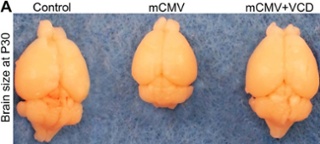-
Jun 20, 2017Press Release, News from SfNPsychiatric Medication Protects Developing Mouse Brain From Most Common Viral Cause of Birth Defects
A clinically available anxiety drug safely and effectively protects against brain defects caused by the mouse version of a common human virus, finds new research published in The Journal of Neuroscience.
-
Jun 20, 2017Press Release, News from SfNAdolescent male mice fed a diet lacking omega-3 fatty acids show increased anxiety-like behavior and worse performance on a memory task in adulthood, according to new research published in The Journal of Neuroscience.
-
Jun 16, 2017News from SfNRead science policy and advocacy news from the week of June 16, 2017.
-
Jun 14, 2017Press Release
Obese mice with a particular version of a gene strongly associated with Alzheimer's disease (AD) in humans show increased Alzheimer’s pathology, according to new research published in eNeuro. The study suggests lifestyle changes could reduce the likelihood of developing AD in individuals with this genetic predisposition.
Individuals who inherit the gene APOE4— approximately 12 percent of the U.S. population — have an increased risk of late-onset AD, but not all carriers develop the disease. Although the role of APOE4 in AD is not known, environmental factors that also increase risk of dementia, such as obesity, may contribute to development of AD.
Christian Pike and Alexandra Moser investigated the interaction between APOE4 and obesity in a mouse model of AD, in which some male mice carry the human version of APOE4 and others carry the more common human version APOE3. The authors found that APOE4-carrying mice fed a Western-like diet high in saturated fat and sugars for 12 weeks had increased deposits of β-amyloid protein as well a greater number of glial cells, characteristic of AD. These changes were not observed in mice carrying APOE3, which could mean that carriers of APOE4 are more susceptible to the effects of obesity on AD.
Article: Obesity accelerates Alzheimer-related pathology in APOE4 but not APOE3 mice
DOI: https://doi.org/10.1523/ENEURO.0077-17.2017
Corresponding author: Christian Pike (Leonard Davis School of Gerontology, University of Southern California, Los Angeles, CA, USA), cjpike@usc.edu
-
Jun 14, 2017Press Release, News from SfNNew research in The Journal of Neuroscience finds that a common symptom of autism spectrum disorder and fragile X syndrome (FXS) — overreaction to touch early in life that persists through adulthood — is present in a mouse model of FXS.
-
Jun 09, 2017News from SfNRead science policy and advocacy news from the week of June 9, 2017.
-
Jun 05, 2017Press ReleaseMild hearing loss from exposure to less than one hour of loud noise leads to a reorganization of circuits in a key midbrain structure of the auditory system in mice, finds new research published in The Journal of Neuroscience.
-
Jun 05, 2017News from SfNRead science policy and advocacy news from the week of June 2, 2017.
-
Jun 05, 2017Press Release
Triggering pathological gamblers to envision a future personal experience reduces their preference for an immediate reward over a larger, delayed award, according to a study published in eNeuro.
-
May 29, 2017Press ReleaseExposure to high-fat diet from childhood may increase the sensitivity of the dopamine system later in adulthood, according to a study in male rats published in eNeuro. The research describes potential mechanisms that, if translated to humans, may drive people to seek foods that contribute to obesity.
Quick Links
Copyright ©
Society for Neuroscience






















